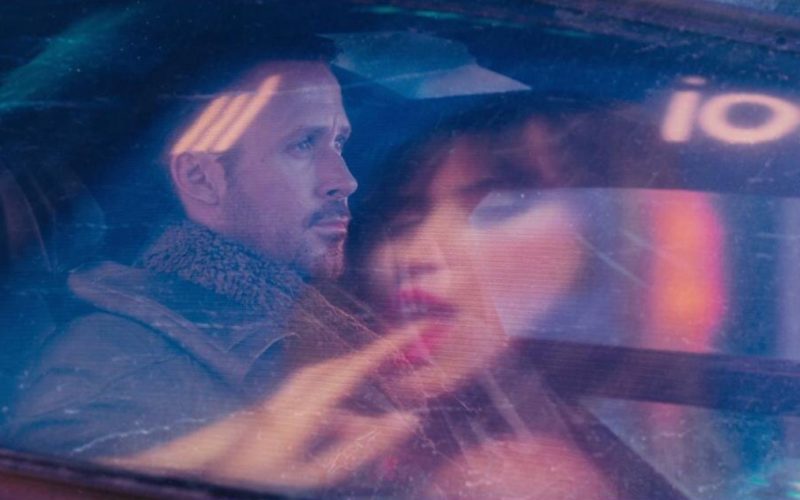Blade Runner 2049 (2017).
Sometimes a film emerges from the Hollywood creative machine that is something of an anomaly. Take 2005’s Serenity, a film that was borne of a television series, Firefly, that was cruelly cut short in its first season, yet somehow the show’s creator, Joss Whedon, was able to convince Universal to give him $40 million dollars to make a film that follows on from the unresolved show that only a small (but fervent) fanbase wanted. The final film, whilst critically well received, wasn’t a box office success but nevertheless a fine film was borne of adversity in a system where such creations are few and far between.
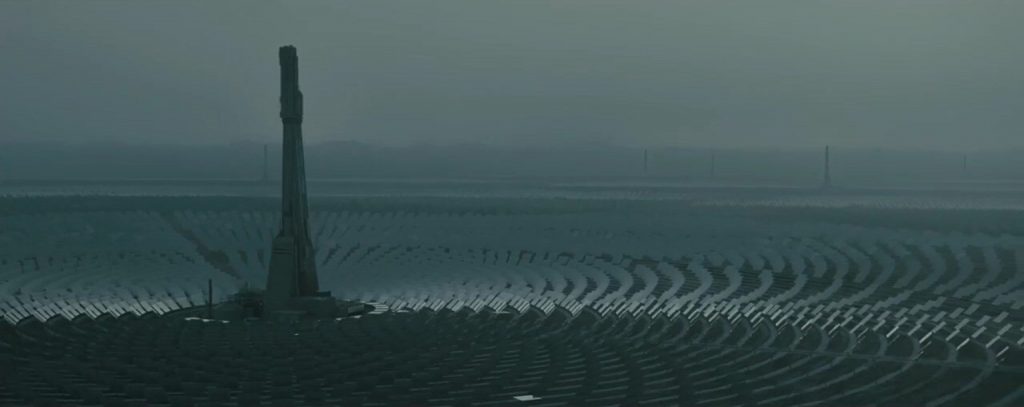
A similar kind of anomalous creation but one with a different sort of parentage is Blade Runner 2049, sequel to the 35 year old Blade Runner. Ridley Scott’s 1982 adaptation of Philip K. Dick’s short story, Do Androids Dream Of Electric Sheep?, was not a successful film, both critically and commercially. It was released in a summer dominated by feel-good family fare such as E.T. and got lost amongst a release schedule that had a glut of genuinely great films. In terms of its theatrical run, Blade Runner failed. But that was not the end, for Blade Runner would slowly claw its way to recognition on home video and over the decades that followed, love and appreciation for Blade Runner would grow to the point where it was, and still is, regarded as a seminal piece of cinematic art like few others, a beautiful and hugely influential film that now takes its rightful place amongst the very best science fiction films ever made.
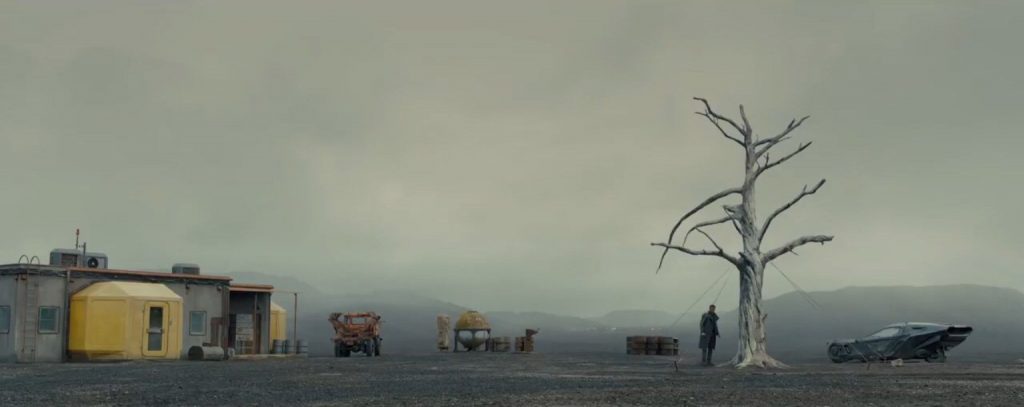
So, in what regard is Blade Runner 2049 to be considered an anomalous creation? Well firstly it’s arguably a sequel that very few people wanted or needed. As much as Blade Runner had unanswered and unresolved elements to its story, these ambiguities form part of what’s great about the film. You don’t need to know what happens to Rick Deckard and Rachel, you can make up your own ending for them, be it happy or otherwise. You also don’t need questions definitively answered regarding whether or not Rachel lives past her supposed 4 year lifespan. Nor do you really need a definitive answer to a question raised in the 1992 Director’s Cut; that of whether or not Deckard is a Replicant. I certainly don’t want that answered because I don’t and never have believed that Deckard is a Replicant. This was never an aspect of the character that either Hampton Fancher or David Webb Peoples incorporated into their scripts and was an idea developed by director Ridley Scott, and one possibly devised for the Director’s Cut and long after the film was first released. There are certainly no firm hints of it in the theatrical cut as there are in the versions that followed. Yet I have no grave problem with what Scott is suggesting, in fact, it adds to the allure of the film and gives it even more depth in terms of the many ways it can be interpreted, no one interpretation being more right than another.
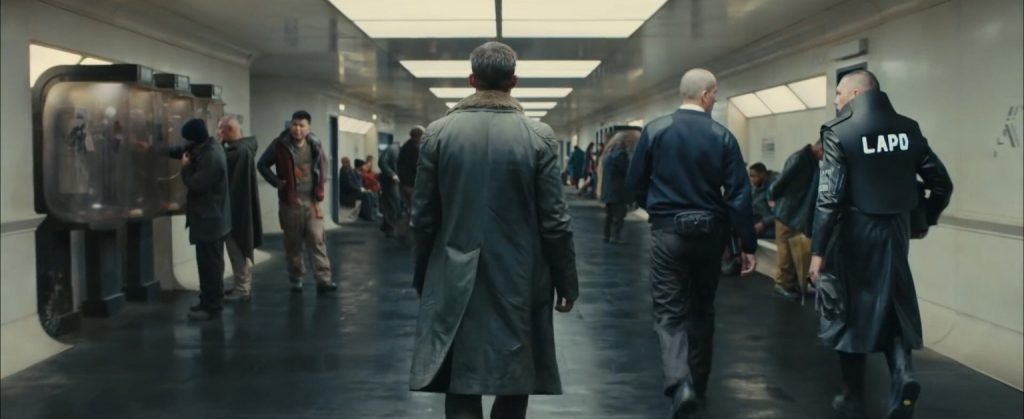
So, we have a deeply revered and beautifully self-contained film that many believe can never be bettered, and it’s now 35 years after that film’s release. That’s a huge gap between the original film and the sequel. What can a follow-up show us that we haven’t seen? What new spin can it give on the tale of a bleak, smog ridden, rain-soaked Los Angeles of the future, a dystopian future we haven’t reached in 2017 and are highly unlikely to do so by 2019, the year in which the original was set? Many questions should be asked as to just why anyone would take the risk of making a sequel to such a unique film, one that’s so incredibly influential and revered as a masterpiece and ultimately a film that, initially at least, was a failure. Well, one answer would be Denis Villeneuve. If ever there was a working director with the vision, the requisite directorial style and capability to somehow recapture some of the magic that made the first film so special then it’s him. He’s already proven himself with a string of critically acclaimed films under his belt such as Prisoners (2013), Sicario (2015) and Arrival (2016), the latter a brilliant piece of modern, thought provoking science-fiction.
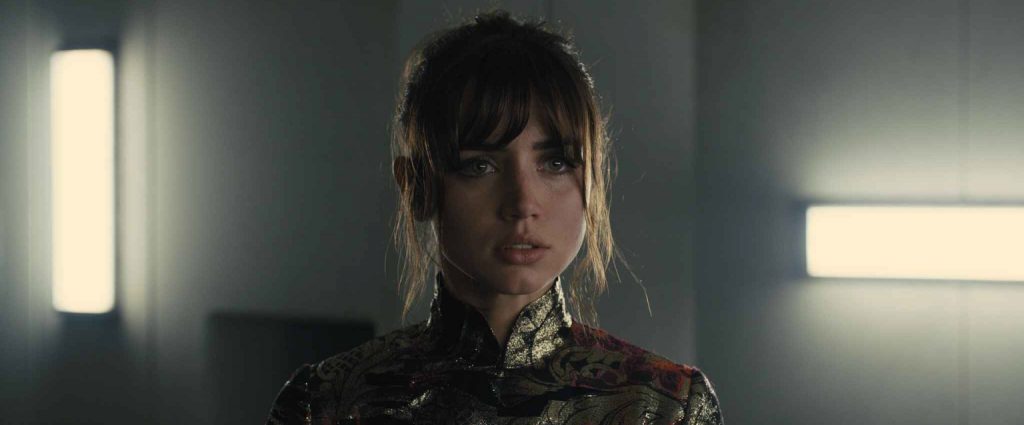
And here we now find ourselves, Warner Brothers having put up $185 million, significantly more than the $28 million the original film cost to make, and that’s not even factoring in marketing costs. They’ve given Villeneuve all the required tools to give this monumental task his best shot and also brought back Hampton Fancher to write along with Michael Green.
So, enough of the preamble, is Blade Runner 2049 the masterpiece that initial critic’s reviews are claiming it to be? Well, that all depends on your point of view as your Blade Runner 2049 experience is one very much dependent upon what baggage you take in with you. If you’re a loyal and long-time fan of the original then you may well have some lofty, almost unattainable expectations. If the original was a film that you just appreciated or even one that you could take or leave, then Blade Runner 2049 may well be more of the same of a film you may not have liked that much in the first place. Either way, it’s likely that once the film reaches a wider audience, it may attract as many fans as it does detractors.
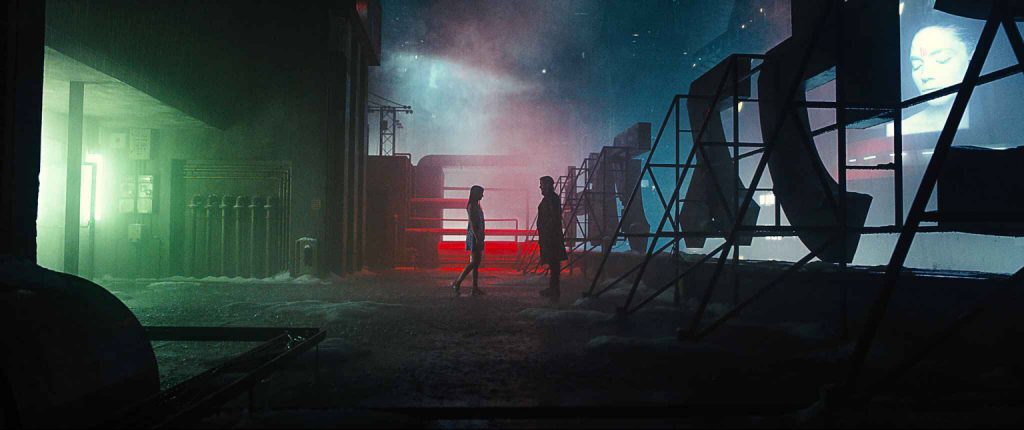
So, what’s the story this time around? The sequel is, unsurprisingly, set 30 years after the original. L.A. is still rain-soaked and smog-ridden. Whilst the Tyrell Corporation has fallen to bankruptcy long ago, it has been replaced by The Wallace Corporation, headed by its blind founder, Niander Wallace (Jared Leto) who continue to manufacture Replicants to be used as labour on the numerous off-world colonies where the majority of Earth’s populace have now emigrated to. Replicants of the Tyrell era are still outlawed on Earth and some still live in hiding meaning that Blade Runners are still required in some capacity to hunt them down, bring them in to be decommissioned or, if they resist, retire them. Our protagonist this time around is both a Blade Runner and Replicant, Officer K (Ryan Gosling), who works for the stoic Lieutenant Joshi (Robin Wright). K lives with his sentient holographic girlfriend, Joi who provides some basic but still loving companionship.
When a retirement mission uncovers a mystery regarding a possible unexpected evolution of the Replicant biology, K is thrust headlong into an investigation that may drastically change the very world he lives in and also uncover previously unknown things about K’s own past. It’s been no secret, but maybe it should have been, that Harrison Ford returns to reprise his role as Rick Deckard, but long before we get to him, K must find a child who may be the first non-manufactured Replicant. In his way is the Wallace Corporation and it’s cooly menacing operative, Luv (Sylvia Hoeks).
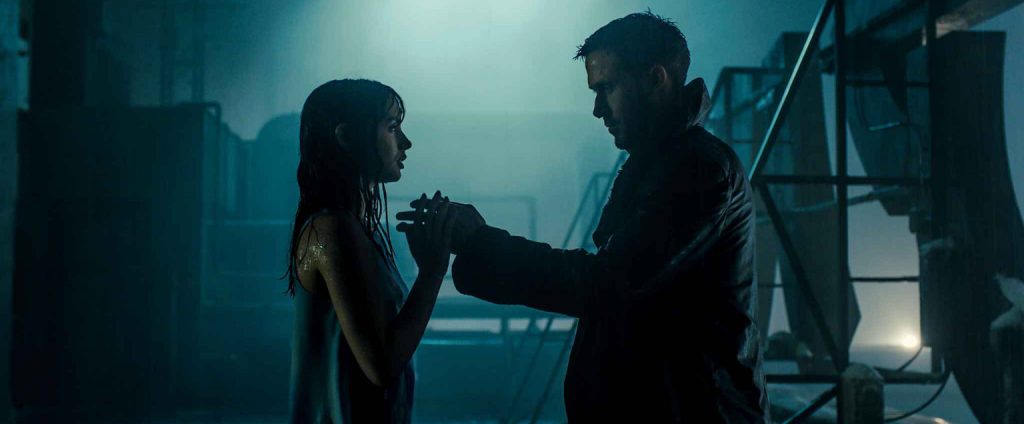
Now discussing Blade Runner 2049 without spoilers is perfectly possible and as many reviews have proven this can be done adequately. However, those reviews have been unanimously positive and have addressed little in the way of anything negative, and prior to the film’s release, such reviews have been the subject of some quite restrictive non-disclosure agreements. Well, those NDA’s no longer apply and I’m now at liberty to discuss in detail some of the film’s finer points. That said, if you’re sure that you’re going to see the film regardless, then I’d advise you to put this review aside and go in blind. Otherwise I’ll keep spoilers to a necessary minimum where possible. You have been warned.
*** SPOILERS AHEAD ***
Blade Runner 2049, from the outset, is jaw-droppingly gorgeous. With Roger Deakins behind the camera and a production department headed by Dennis Gassner, the film looks uniformly spectacular. Rarely is there a frame that you couldn’t pause and hang on your wall. It truly is a visual feast that, on the whole, feels like an evolution of the same world as we saw in the original. The visual effects are superb, any CGI used blends seamlessly with models and practical effects and sets, and any feeling of artificiality is negligible. This feels like a living, breathing world albeit one that’s somewhat more sparsely populated than the original. One assumes that many more of Earth’s inhabitants have left for the off-world colonies in the intervening years.
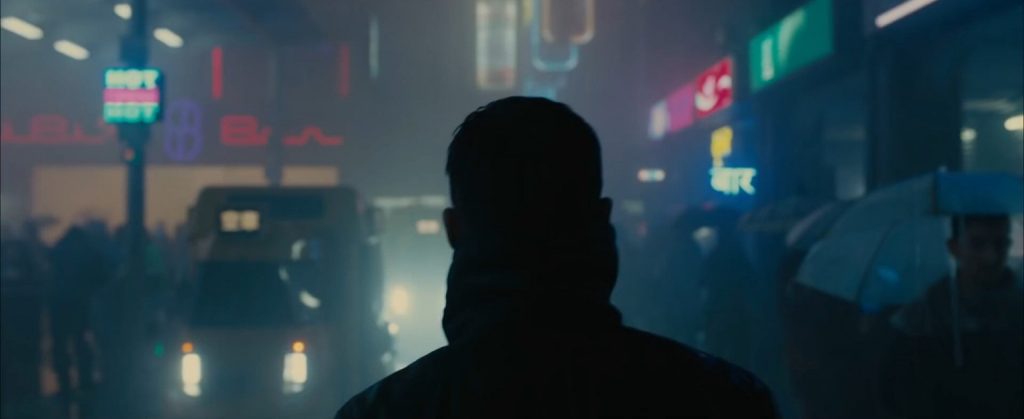
The performances generally vary from good to great. Gosling as K is brilliant. He’s neither cold and robotic nor cliched in his conflict. He merely does as his boss tells him even if he doesn’t particularly like his work, much like Deckard before him but with an inherent morality at his core. His relationship with his beautiful holographic companion Joi (played brilliantly by Ana de Armas) is very sweet without being cloying and provides much of the film’s heart and soul with its exploration of the themes of artificial sentience. The rooftop scene where Joi, now tethered to a portable holographic emitter, first experiences the outside world is beautifully conceived and one of several scenes of an artificial being experiencing new things and complex human emotions and experiences. Robin Wright, who seemed quite one dimensional in the trailers and promotional footage, is actually very strong and far less the cliched stern boss she initially appeared to be and may actually be more on the side of good than she first appears. Speaking of good and bad, protagonist and antagonist, Replicants are now very much seen by us, the viewer, as innocent prey, hunted for being different to their human creators and the reasons for such hatred of Replicants never really seems to be explained to any satisfactory degree. In the original they were a threat but now, having lived in hiding for decades, they pose no discernible threat and something that wasn’t an issue in the first film seems to be somewhat illogical here given that so many other, newer forms of Replicant are active on Earth.
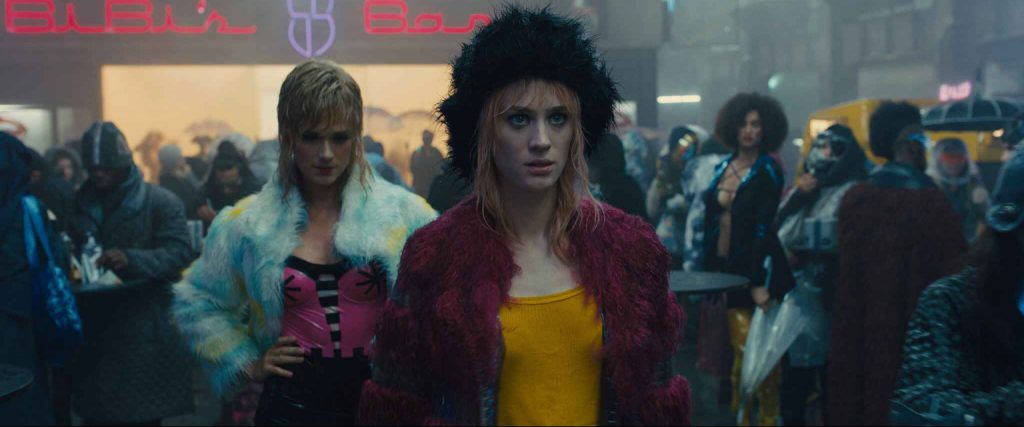
One performance that I definitely can’t put in the same category as the others is Jared Leto’s. It seems that Leto has become an actor who must imbue each successive role with a quirk or peculiarity, some fitting, but others, such as his blindness here which he could surely cure with some artificially created eyes, seem unnecessary. After all, if he’s the foremost authority on artificial biology, then this must surely be within his grasp. What causes my consternation though is the way in which Leto talks. His bizarre, laboured delivery is unlike that of any other character in either film and frankly comes across as rather ridiculous given that he’s one of the few human characters in the film, so he can’t even use the excuse of being artificially created. His odd mannerisms are taken to extremes and he pulled me out of the film every time he was on screen. Thankfully Wallace’s main operative, Luv, played by Sylvia Hoeks is a rather well developed character and Hoeks plays her as a ruthless killer whilst managing to carefully sidestep some oft-seen antagonist cliches.
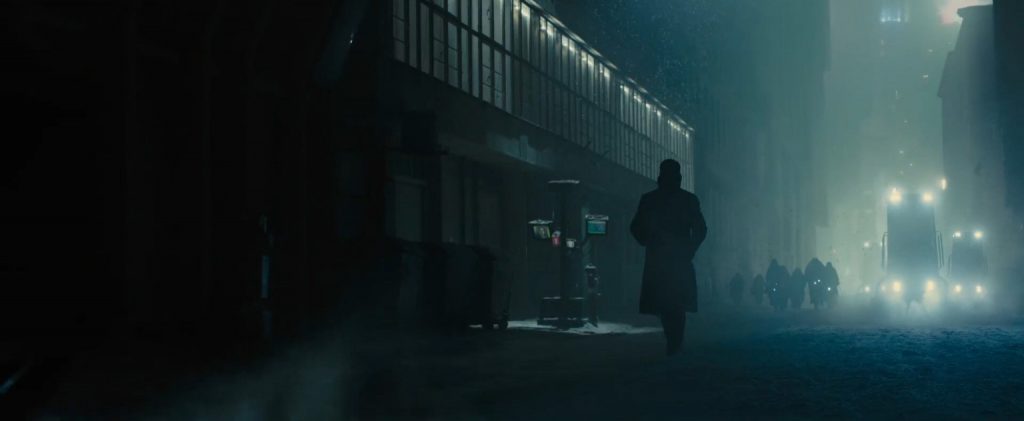
The pace of the film in comparison to the original is similarly languid and it takes its time to revel in its well crafted world but unlike the first film, with its efficient 117 minute runtime, 2049 is a much longer film at 163 minutes and many may find the pace of the film a negative given the considerably extended runtime. Personally I expected the pace to be similar to the original and that it eschews the need to follow a strict formula of scattering action evenly throughout the film should be applauded but I did find myself looking at the ever glowing tritium indices of my watch several times in the film’s latter half (rather spookily, tritium was mention in the film on one occasion mere seconds after I looked at my watch).
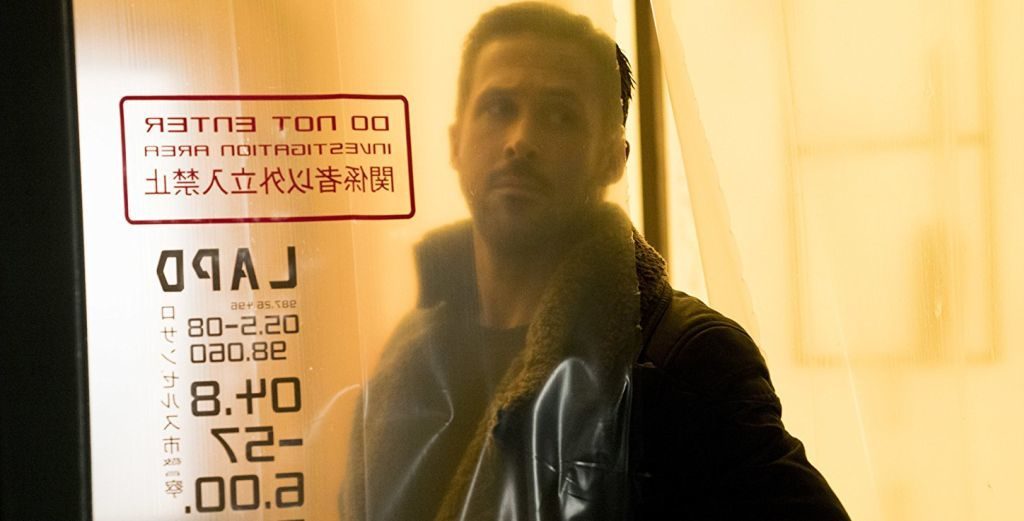 The score, by Benjamin Wallfisch and Hans Zimmer, is very fitting and free of some of Zimmer’s more distracting musical tropes we hear in some of his films. That said, the score, on first listen at least, lacks some of the more memorable motifs and range of Vangelis’ incredible score for the original. The original had an almost perfect melding of score and sound design unlike any other film and sadly that hasn’t been replicated in the sequel to anywhere near the same extent with the score often dominating scenes when it should be subtly assisting in the creation of an ambience and sense of awe in concert with the visuals. That said, I suppose it’s as good as a non-Vangelis Blade Runner score could hope to be.
The score, by Benjamin Wallfisch and Hans Zimmer, is very fitting and free of some of Zimmer’s more distracting musical tropes we hear in some of his films. That said, the score, on first listen at least, lacks some of the more memorable motifs and range of Vangelis’ incredible score for the original. The original had an almost perfect melding of score and sound design unlike any other film and sadly that hasn’t been replicated in the sequel to anywhere near the same extent with the score often dominating scenes when it should be subtly assisting in the creation of an ambience and sense of awe in concert with the visuals. That said, I suppose it’s as good as a non-Vangelis Blade Runner score could hope to be.
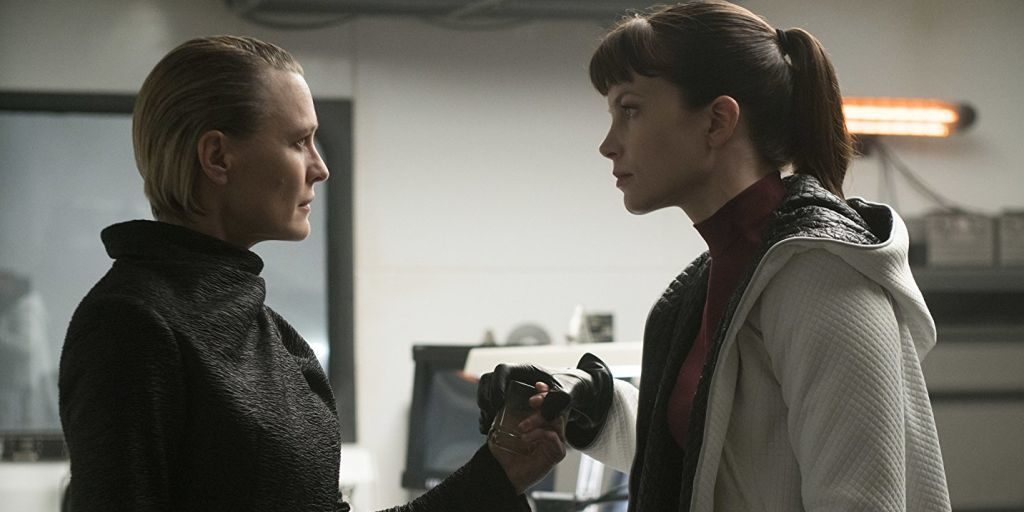 The first act is strong and propels the narrative forward whilst immersing us in the film’s exquisite world whilst developing the core characters. As the plot unfolds in the second act, we see some staggeringly well constructed locations such as the stunning waste disposal area that occupies what was once San Diego. I really cannot stress how immersive a world this is and I was aware of how slack the visuals were rendering my jaw throughout the first two acts. In spite of this, there are some elements of the production design that smack of impracticality and style over function such as the absurdly designed reception area at a DNA archive that K visits and some of the overly showy lighting effects in use at Wallace HQ.
The first act is strong and propels the narrative forward whilst immersing us in the film’s exquisite world whilst developing the core characters. As the plot unfolds in the second act, we see some staggeringly well constructed locations such as the stunning waste disposal area that occupies what was once San Diego. I really cannot stress how immersive a world this is and I was aware of how slack the visuals were rendering my jaw throughout the first two acts. In spite of this, there are some elements of the production design that smack of impracticality and style over function such as the absurdly designed reception area at a DNA archive that K visits and some of the overly showy lighting effects in use at Wallace HQ.
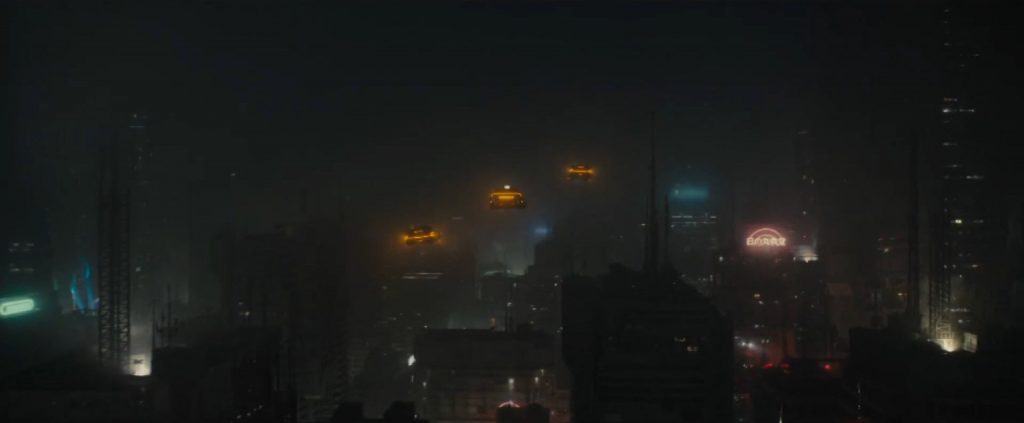
Now, here’s where the really spoilerific discussion must take place as we move into the film’s third act. When K’s investigation takes him to the desolate and very orange tinged site of a previous dirty bomb detonation, we finally get to meet Rick Deckard and it’s here that the fairly tight plot starts to come apart somewhat. The film spends far too much time allowing Deckard and K to pointlessly duke it out. The scene with Deckard fighting with and then repeatedly punching K goes on far too long and borders on absurd, and in places, Ford actually looks rather silly and nothing like an organic evolution of the über cool, Marlowe-inspired detective we saw 35 years ago. Ford actually brings little to the film that Gosling and co. haven’t already provided. At least in the (rightly maligned) fourth Indiana Jones film he looked and felt like an older Indiana Jones. Here it just looks like Ford has walked onto the set in his lounging-around-the-house attire. It’s far more than a cameo but I was left asking whether Ford’s inclusion was actually necessary as it does hint at answering some of the aforementioned questions from the first film that I simply don’t want or need answered. And it’s here that I lead back to the fact that you’ll get from Blade Runner 2049 what you put into it, and it’s here where my personal take on the original is somewhat sullied by a sequel that up until this point, had been doing an admirable job of following on from the first film.
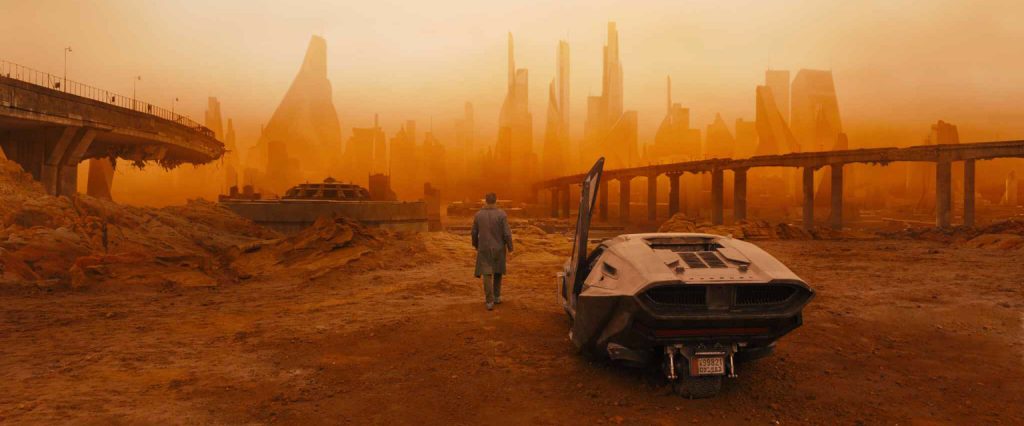
We are led to believe that K may have an origin and in turn a destiny that, whilst somewhat predictable, was certainly more satisfying than the ultimate truth of his existence following an unnecessary fake-out that isn’t anywhere near as clever as the writers seem to think it is. The film does seem to set up a sequel where Replicants rise against their human oppressors but where K would fit into that sequel is now rendered very much unclear and personally, I can’t see Ford carrying an entire third Blade Runner film given his advanced years. Another area the film falters in the last act is a complete lack of resolution to Wallace’s arc, rounding him off as one of the film’s clear negative aspects. Both Wallace and Ford are also key in a scene that will add fuel to the fire for those who lambast the use of CGI to resurrect, or in this case restore to youth a now aged actor. The effect nearly holds up but it seems the technology isn’t there yet and the scene did pull me out of the film and seems rather redundant in hindsight.
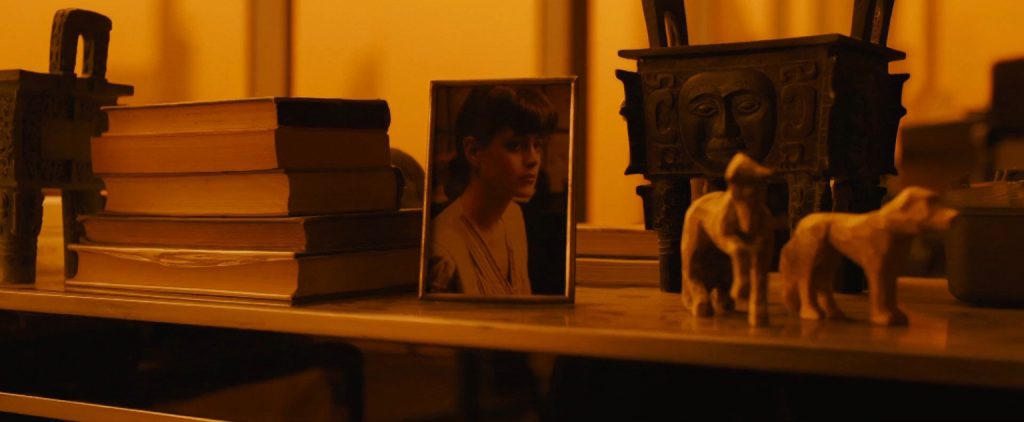
I found Blade Runner 2049 to be emotionally rather more cold than the first film. I wasn’t overly moved throughout and it certainly never reaches any sort of comparable peak to Roy Batty’s incredible “Tears in the rain” soliloquy from the first film, although it certainly tries to mimic that scene with mixed results. Even Ford’s ultimate fate contradicts things set up earlier in the film regarding the reasoning behind some of the choices he’s had to make since going on the run at the end of he first film. That said, these may be things that go over the head of many of Blade Runner 2049’s audience and this goes back to what I said about your enjoyment being wholly dependent on your relationship with the original.
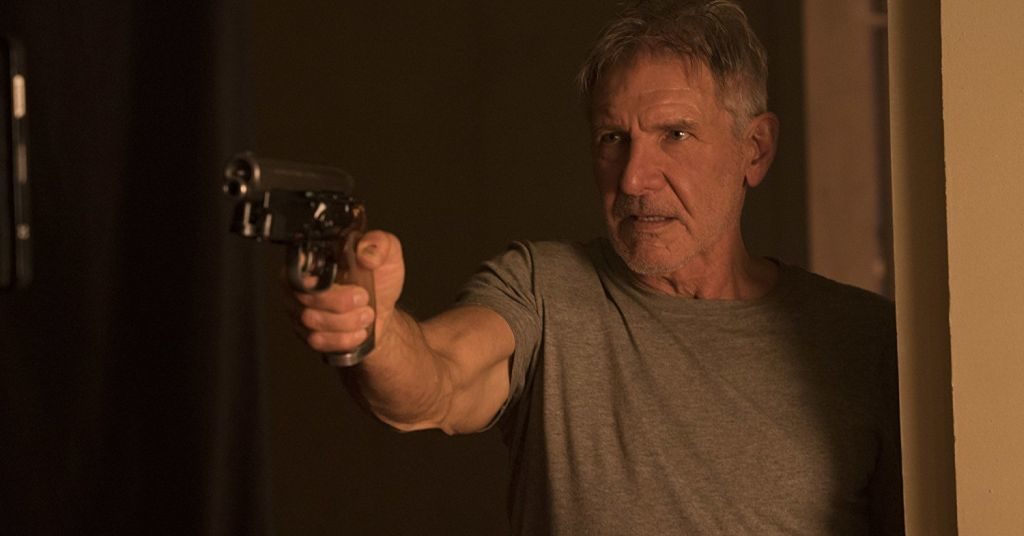 So, whilst I’ve had to dig into some spoiler material in order to highlight some of the missteps the film makes, it’s still better than a sequel to Blade Runner has any real right to be. Whether it enhances your overall experience of the world created in Scott’s original is very much dependent on your relationship with that film. Whilst it is not the flawless masterpiece many are claiming it to be it’s still a tremendous achievement in many respects. Apart from Leto and, unfortunately Ford, the performances are very good across the board. The film looks truly spectacular and the world it creates is once more incredibly immersive. The themes of sentience and exploration of the potential evolution of artificially created life are very well handled and the one major development of the Replicants is a perfect progression of Eldon Tyrell’s mantra of “More human than human”.
So, whilst I’ve had to dig into some spoiler material in order to highlight some of the missteps the film makes, it’s still better than a sequel to Blade Runner has any real right to be. Whether it enhances your overall experience of the world created in Scott’s original is very much dependent on your relationship with that film. Whilst it is not the flawless masterpiece many are claiming it to be it’s still a tremendous achievement in many respects. Apart from Leto and, unfortunately Ford, the performances are very good across the board. The film looks truly spectacular and the world it creates is once more incredibly immersive. The themes of sentience and exploration of the potential evolution of artificially created life are very well handled and the one major development of the Replicants is a perfect progression of Eldon Tyrell’s mantra of “More human than human”.
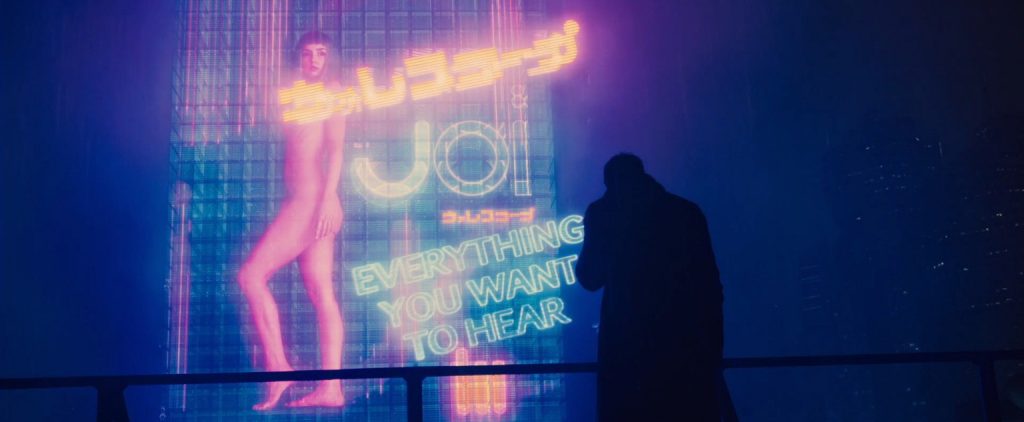
Denis Villeneuve has crafted a film that some may find overly long and tiresome but those same people will likely feel the same way about Ridley Scott’s original. Firm fans of the 1982 film should, in general, find a lot to like, even love about this new film, again one’s expectations going in are key in this regard. In some respects this is a masterful film in that it looks incredible and otherworldly and therefore is at least justified in its existence as a piece of art. It does have undeniable flaws but these shouldn’t hamper the majority of Blade Runner fans’ enjoyment of this new film, and as much as I’ve not shied away from what didn’t work for me, there was a great deal that did work, first and foremost was Gosling who actually rendered Ford’s inclusion redundant to a degree. The bottom line is, if you crave beautifully crafted, thought provoking science fiction then I find it highly unlikely that you’ll see a film that better satisfies these cravings this year. Blade Runner 2049 was a sequel I never really wanted or needed but then again I never expected to ever see a sequel to the original anyway, and as sequels to seminal masterpieces go, it has to be said that Denis Villeneuve has indeed done a man’s job.
Film ‘89 Verdict – 8/10

